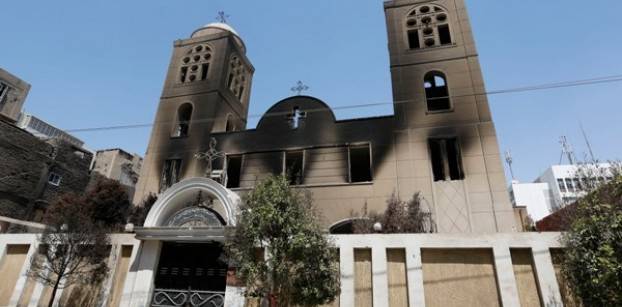Egypt's church building law upholds restrictions over church construction - HRW

The burnt and destroyed Evangelical Church are seen in Mallawi at Minya governorate, about 245 km (152 miles) south of Cairo August 17, 2013. REUTERS/Stringer
CAIRO, Sept 15 (Aswat Masriya) - Human Rights Watch (HRW) described Egypt's recently adopted church building law as discriminatory against Christians due to various stipulations that maintain "restrictions over the construction and renovation of churches."
Egypt's parliament passed the church building and renovation law on Aug. 30 after discussions between Coptic Church leaders and government officials led to an agreed upon a draft.
However, controversy surrounding the law persists.
In a statement on Thursday, HRW criticised the new law mainly on three points; the absolute authority given to governors in approving or denying church-building permits, the requirement that churches be built in proportion to the number of Christians in a given area and the chance that decisions on church construction be subject to risky security provisions.
Article 5 of the law gives governors authority to approve or deny church-building permits, and necessitates providing reasons in the case of refusal. HRW pointed that there was no stated way to appeal the decision when the permit is refused.
Prior to the adoption of the law, critics argued that the authorisation to build churches would remain in the hands of the executive branch, which runs contrary to suggestions by several priests to transfer authority to an independent body.
In addition, the requirement that the size of the church be "commensurate" with the number of Christians in the area is difficult to implement as the government has not released statistics about Egypt's Christian minority for "national security" reasons, HRW said.
Egyptian Christians make up about a tenth of the country's 90 million population and are the Middle East's largest Christian community.
HRW further criticised the clause that stipulates "security and public safety" as factors that influence the decision to build churches, arguing that it would effectively allow "mob violence to dictate whether church construction is authorised."
Sectarian violence in past months has often erupted on the backdrop of suspicions that Christians are building churches.
The new law allows existing unauthorised churches to legalise their status after submitting their papers to an administrative committee formed by the prime minister.
However, many old churches would fail to meet the law's specifications regarding the structure of the church, thus leaving the issue unresolved, according to the Egyptian Initiative for Personal Rights (EIPR).
EIPR has recorded at least 77 cases of sectarian violence in the Southern Minya province from the 2011 Uprising until Jan. 2016, including attacks on churches, and other religious buildings and schools.
Suspects in such incidents were mostly arrested and then released shortly afterwards without proper investigation. Many cases were destined for what is known as "reconciliation sessions" which take place outside the law.
Rights groups repeatedly criticised this method of reconciliation as it deprives the victims of their rights and allows impunity for perpetrators.
HRW said that the Egyptian parliament should amend the new law to apply to all places of worship "in a manner that fully respects the right to freedom of religion."
However, talk about a unified places of worship law has so far failed to materialise into concrete action.









facebook comments